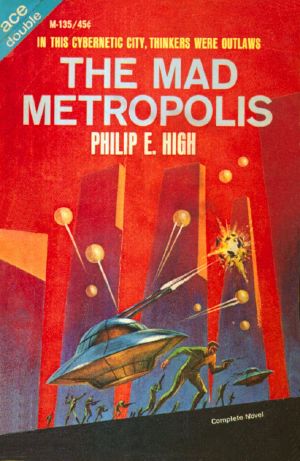The Mad Metropolis

- Authors
- High, Philip E.
- Publisher
- Ace
- Tags
- science fiction
- Date
- 1966-01-01T00:00:00+00:00
- Size
- 0.27 MB
- Lang
- en
One of Philip E High's most imaginative visions of the future starts with a "Prole" e.g. an ordinary citizen, being trapped outside the building where he lives and works. This makes him prey to all manner of nasties - first he is hunted by a "psycho" whose bad intentions are signalled when she speaks to him in a parody of Keats' "La Belle Dame Sans Merci." Will he fall into her hands, or be "rescued" to face the doubtful mercies of the "Civil and Voluntary Police Organisation," who are also nicknamed the "Nonpol" or "Gestap" (from their propensity to beat up their suspects) ? Is it possible that this apparently insignificant displaced prole has a role he does not even suspect in the great events which are about to happen ? This is a world of mega-city states and illusions: some cities are known as "Free Cities" but their ordinary citizens or "proles" have little true freedom, while others are known as "controlled cities" and are run on Stalinist lines. All but the poorest individuals can control their appearance, using machines called hypnads to project illusions of health and beauty. Similar machines put a beautiful facade on the appearance of the great cities. But the reality is a corrupt, unstable society, whose leaders are preparing to take desperate measures in an attempt to arrest a spiral down to collapse. The most powerful politicians in the free world, the Mayors of Free City One and Free City Two (formerly known as New York and London) have been conspiring with the mayors of other free cities to take control of the world and impose the measures which they believe are desperately needed to stave off catastrophe. But a supercomputer which is part of their plan gets ideas of its own ... This book includes a lot of ingenious ideas, some of them well ahead of their time and one or two of which may have been part of the inspiration for later SF classics. For example, "Mother" in this book may be seen as a slightly more benign fore-runner of Skynet. There is also some amusing humour in this book, which I can't really describe without giving away too much of the plot. I used to love Philip E High's science fiction stories at the time they were written, mostly around the 1970's. Many of them have dated - the science was not always brilliant even by the standards of 1970, and many of the stories present humans as uniquely talented in a way which jars somewhat now. However, High's best stories have not dated and are still fun to read. "Double Illusion" is one of the better ones. Perhaps not quite as good as "The Time Mercenaries" which is my personal favourite of all the Philip E High stories, but it's up there with "Come, Hunt an Earthman," "Sold for a Spaceship," "Blindfold from the Stars," and "Speaking of Dinosaurs" which are some of the other stories by this author which I can recommend.